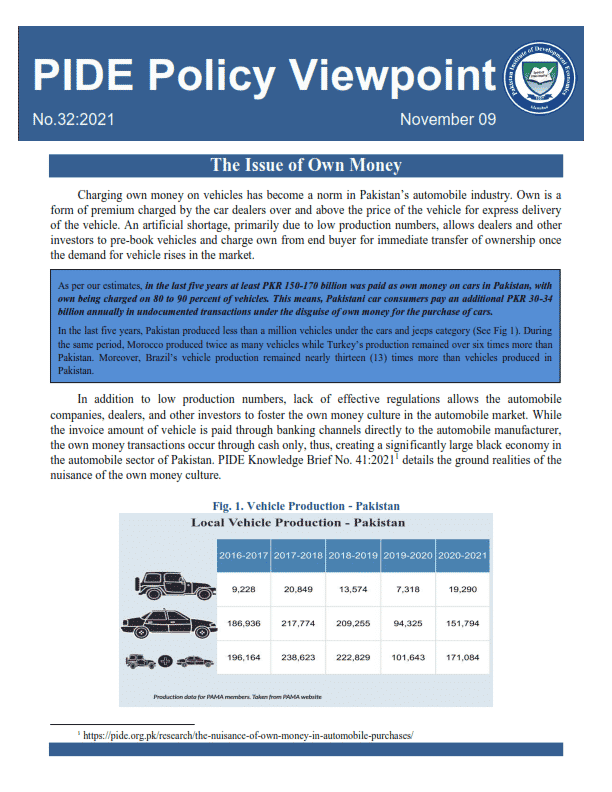
Pakistan Institute of Development Economics
- Home
Our Portals
MenuMenuMenuMenuMenuMenuMenu - ResearchMenuMenuMenuMenuMenuMenuMenu
- Discourse
- The PDR
- Our Researchers
- Academics
- Degree Verification
- Thesis Portal
- Our Portals
The Issue of Own Money
The Issue of Own Money
Charging own money on vehicles has become a norm in Pakistan’s automobile industry. Own is a form of premium charged by the car dealers over and above the price of the vehicle for express delivery of the vehicle. An artificial shortage, primarily due to low production numbers, allows dealers and other investors to pre-book vehicles and charge own from end buyer for immediate transfer of ownership once the demand for vehicle rises in the market.
As per our estimates, in the last five years at least PKR 150-170 billion was paid as own money on cars in Pakistan, with own being charged on 80 to 90 percent of vehicles. This means, Pakistani car consumers pay an additional PKR 30-34 billion annually in undocumented transactions under the disguise of own money for the purchase of cars.
In the last five years, Pakistan produced less than a million vehicles under the cars and jeeps category (See Fig 1). During the same period, Morocco produced twice as many vehicles while Turkey’s production remained over six times more than Pakistan. Moreover, Brazil’s vehicle production remained nearly thirteen (13) times more than vehicles produced in Pakistan.
In addition to low production numbers, lack of effective regulations allows the automobile companies, dealers, and other investors to foster the own money culture in the automobile market. While the invoice amount of vehicle is paid through banking channels directly to the automobile manufacturer, the own money transactions occur through cash only, thus, creating a significantly large black economy in the automobile sector of Pakistan. PIDE Knowledge Brief No. 41:2021[1] details the ground realities of the nuisance of the own money culture.
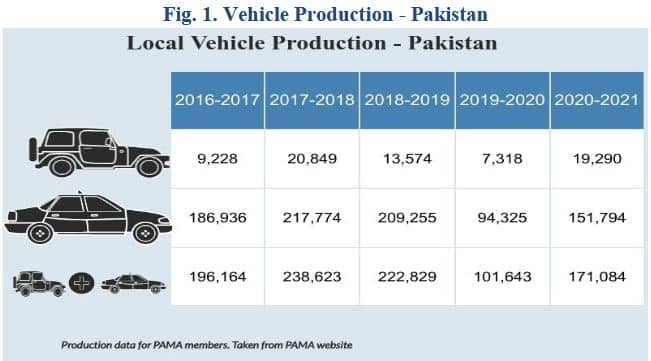 ________________________
________________________
[1] https://staging.letsworkitvip.com/research/the-nuisance-of-own-money-in-automobile-purchases/
POLICY MEASURES
Given that the production of automobiles in Pakistan is being done on-demand, rather than mass manufacturing, just in time or even lean production, the justification for charging own money does not make sense. The question is, what can the government do about this nuisance from a policy point of view—both in the short term and in the long run.
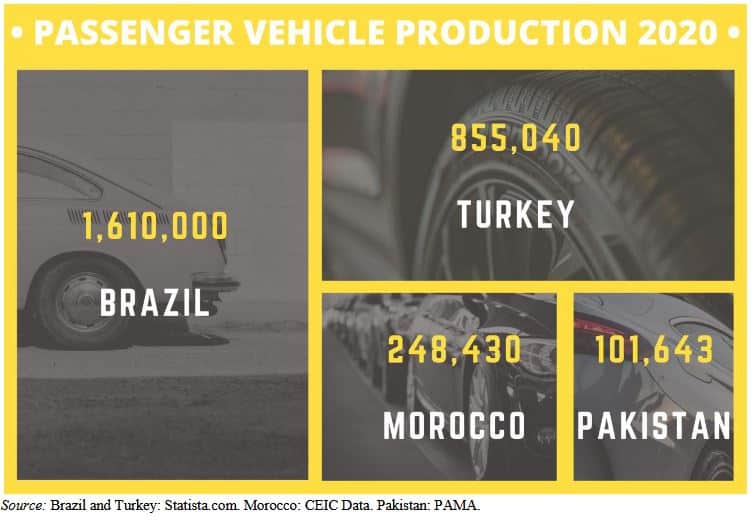 The answer to this question lies in short term measure(s) that the government can adopt, and the transformation in manufacturing that must be encouraged in the long term. As the source of the problem is on the supply side, in the short term the government must impose a ban on automobile bookings. Given the untapped demand in the domestic market, manufacturers must start manufacturing at capacity and supplying their vehicles in the market for sale as soon as they are manufactured. Customers will then purchase their desired vehicle directly from the showroom after negotiating the price rather than booking them in advance.
The answer to this question lies in short term measure(s) that the government can adopt, and the transformation in manufacturing that must be encouraged in the long term. As the source of the problem is on the supply side, in the short term the government must impose a ban on automobile bookings. Given the untapped demand in the domestic market, manufacturers must start manufacturing at capacity and supplying their vehicles in the market for sale as soon as they are manufactured. Customers will then purchase their desired vehicle directly from the showroom after negotiating the price rather than booking them in advance.
Long- and Short-Term Policy Measures
- Short term: Stop bookings of vehicles that have not been produced yet
- Long term: leverage benefits and concessions to push for expansion of productive capacity
There is no reason why a model like that in other countries cannot be adopted here, with a minimum price for each model of vehicle is notified below which a dealer will not sell a vehicle. Dealers should be free to charge premiums for their services, but consumers are free to shop around and choose the premium they are willing to pay. Setting a price cap or ceiling in the market translates to intervening in the market, and our experience has shown time and again that will not work and only creates further distortions.
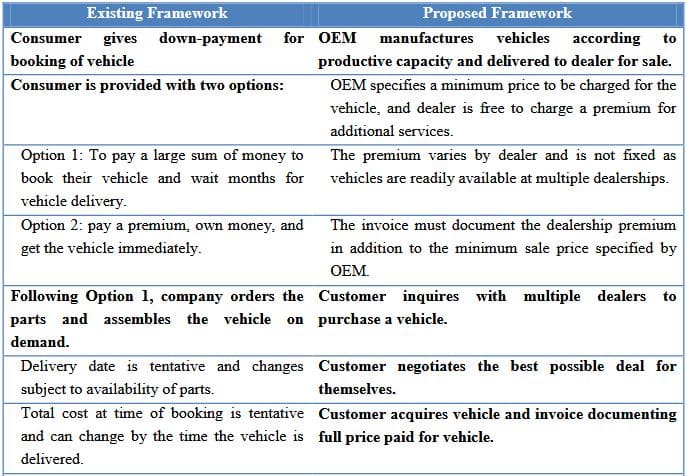
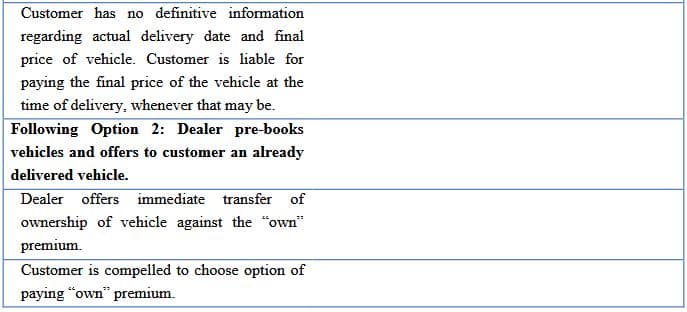
Regarding the long-term measures, the snapshot of productive capacity in the country, and comparative perspective has highlighted that there is scope for expansion of production capacity in the economy. That is why the recent focus on attracting new entrants into the market is a promising start. Now the government must leverage any concessions or benefits the new entrants and incumbents receive to push for an expansion of production capacity in the coming years. To lower costs it would be in the interest of manufacturers to source parts locally, for which the automotive parts industry needs to develop in terms of their manufacturing processes and quality control. This has been accomplished successfully in the past, in tractors and motorcycles segment of the market. However, this effort requires thinking past immediate profits and windfall gains and aiming for sustained growth and profits in the long term.

